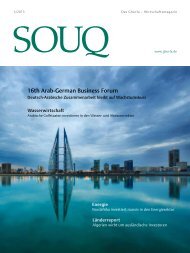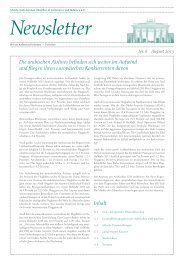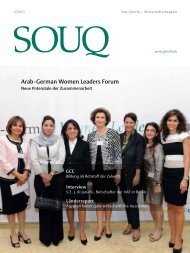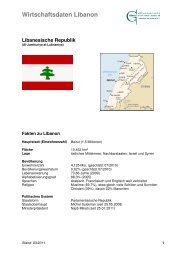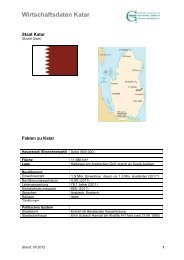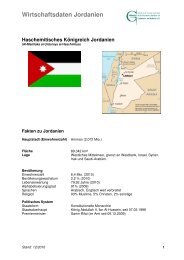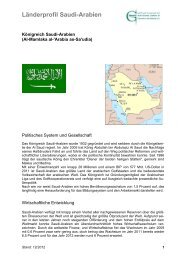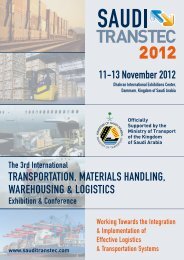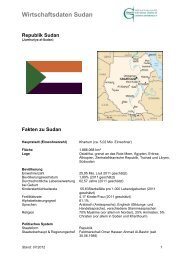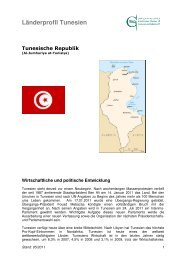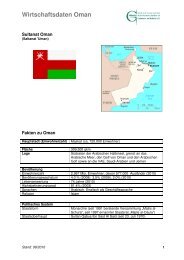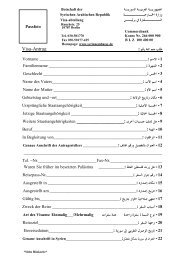Saudi-Arabien Wirtschaftshandbuch Saudi Arabia Business ... - Ghorfa
Saudi-Arabien Wirtschaftshandbuch Saudi Arabia Business ... - Ghorfa
Saudi-Arabien Wirtschaftshandbuch Saudi Arabia Business ... - Ghorfa
Sie wollen auch ein ePaper? Erhöhen Sie die Reichweite Ihrer Titel.
YUMPU macht aus Druck-PDFs automatisch weboptimierte ePaper, die Google liebt.
von 120 Mrd. US$ und Ausgaben von 109 Mrd. US$<br />
mit einem Überschuss abschließen.<br />
Der Internationale Währungsfonds hat anlässlich seiner<br />
zuletzt im September 2007 mit <strong>Saudi</strong>-<strong>Arabien</strong> geführten<br />
Konsultationen die von der Regierung ergriffenen Sparmaßnahmen<br />
im Staatswesen, die weitere Verringerung<br />
der Verteidigungsausgaben, den Subventionsabbau sowie<br />
die Verbreiterung der Einkommensbasis als bedeutungsvoll<br />
für die weitere Konsolidierung des Budgets<br />
hervorgehoben. Ferner hat der IWF die Regierung ermuntert,<br />
die Vorbereitungen für die Einführung einer<br />
mittelfristigen Finanzplanung zügig umzusetzen.<br />
–––––––––––––––––––––––––––––––<br />
StAte fInAnceS<br />
Generally, the status of the state budget depends on the<br />
development of the oil price as the oil economy generates<br />
around 82% of the budget income. In light of the current<br />
oil price developments, the budget situation has stabilised<br />
significantly since 2000; this is reflected in the abovementioned<br />
reduction of the internal level of debt. Also,<br />
the balance sheets of the autonomous state institutes, such<br />
as the Public Pension Agency, the General Organization<br />
for Social Insurance and the Public Investment Fund,<br />
have been improved.<br />
The oil income more than doubled in the period between<br />
2001 and 2007 whilst the non-oil income grew by approx.<br />
60%. This clearly shows that the government needs<br />
WirTSchAfTSTrenDS – – economIc trendS<br />
to strive to make the tax system more effective and to rationalise<br />
the price structure of state goods and services.<br />
With regard to expenditure, the reduction of subsidies is<br />
still on the agenda. The favourable development of the<br />
income allows a significant increase in expenditure in<br />
social areas, which the state feels are important, such as<br />
education, health, social welfare and the labour market.<br />
The percentage of this expenditure compared to the total<br />
expenditure is around 36% (2007); however the percentage<br />
of public administration costs is still 21%, whilst the<br />
investment expenditure totals 8%.<br />
Continued economic growth and increasing oil prices<br />
have led to a favourable budget trend with growing surpluses<br />
in recent years. These budget surpluses will be used<br />
specifically to further reduce the internal debt, to realise<br />
infrastructure measures and to stock up the state development<br />
funds.<br />
The budget for 2007 continues with the previous primary<br />
economic policies. Income of 193.7 billion US$ was<br />
achieved against expenditure of 122.2 billion US$, which<br />
again meant that a surplus was generated. The main areas<br />
of the expenditure are the social fields of education, health<br />
and the labour market and also the sectors of water, waste<br />
water and traffic infrastructure (roads, ports, airports, railways).<br />
New projects in the industrial towns of Jubail and<br />
Yanbu and agricultural projects were given priority here.<br />
The state costs were also high. The high level of expenditure<br />
for personnel combined with the social system and defence<br />
expenditure also burdened the budget heavily.<br />
The budget draft for 2008 again concentrates on the<br />
development of the social infrastructure, in particular<br />
education, health, water and roads. The central focus is<br />
also on research and development projects and the introduction<br />
of information technology in the public administration<br />
system. Furthermore, the aim is to also support<br />
economic growth and create jobs by increasing the investment<br />
expenditure. In 2008 again, the budget will generate<br />
a surplus based on a planned income of 120 billion<br />
US$ and expenditure of 109 billion US$.<br />
After meetings with <strong>Saudi</strong> <strong>Arabia</strong> in September 2007,<br />
the International Monetary Fund highlighted the economy<br />
measures taken by the government in the state administration,<br />
the further reduction of defence expenditure,<br />
the reduction of subsidies and the broadening of the<br />
income base as important for the further consolidation of<br />
the budget. Also, the IMF encouraged the government to<br />
finish the preparations for the introduction of a mediumterm<br />
financial plan quickly.<br />
33



